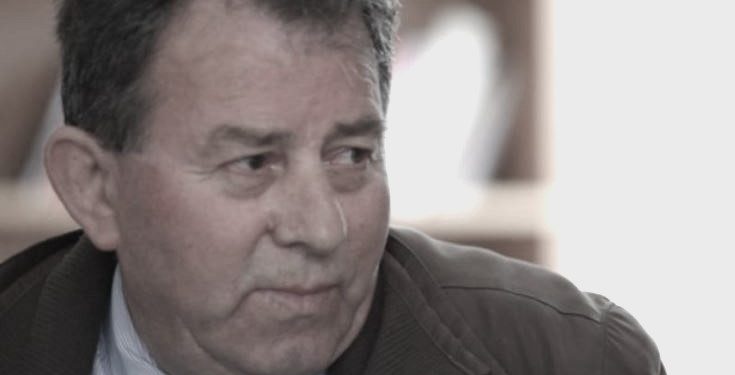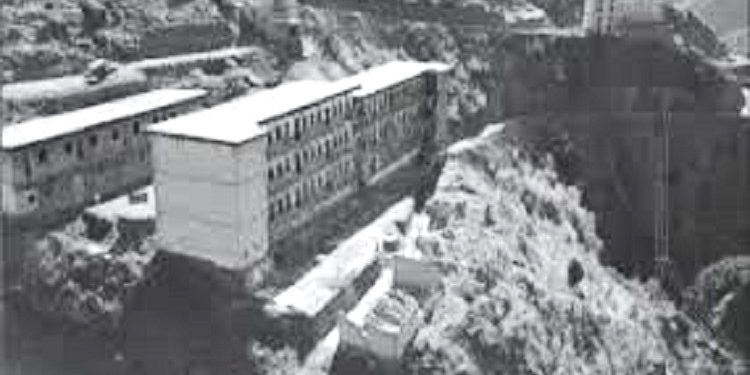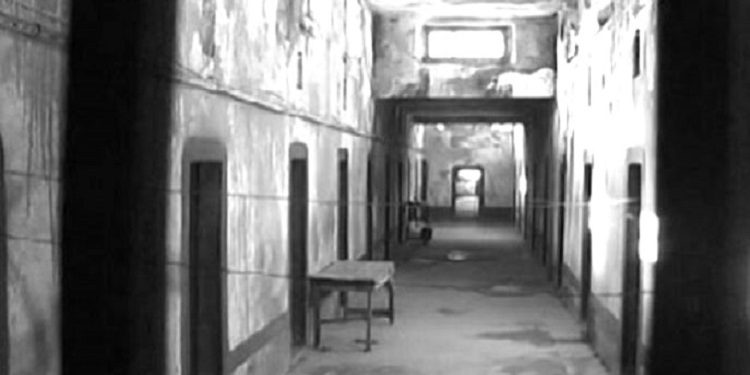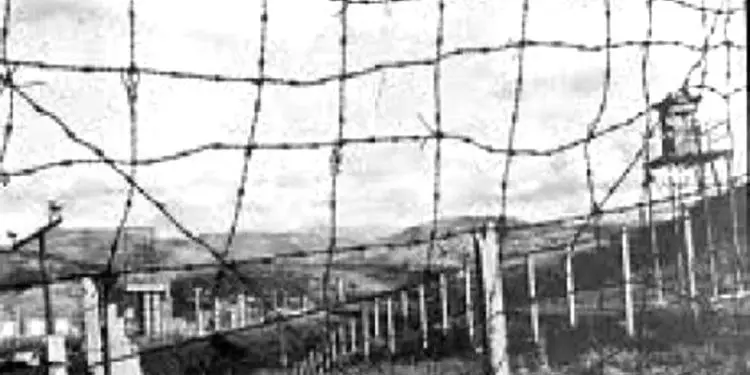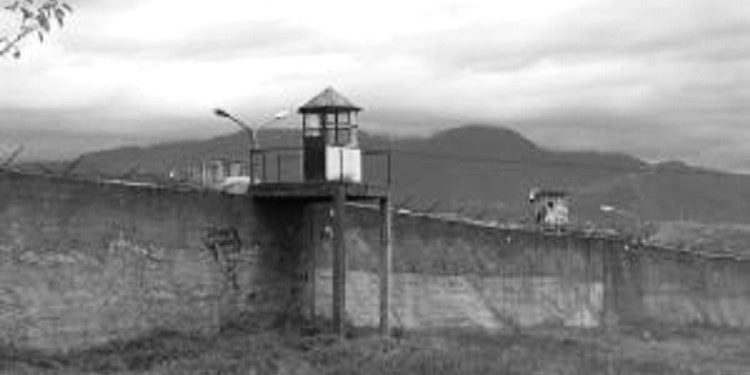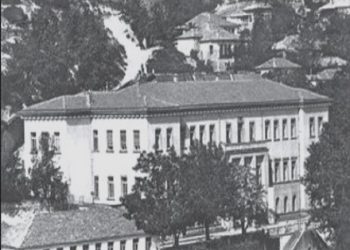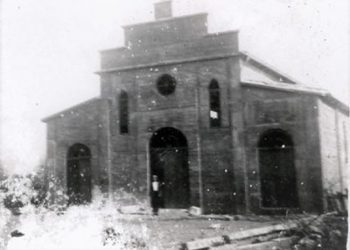By Shkëlqim ABAZI
Part twenty-four
S P A Ç
The Grave of the Living
Tirana, 2018
(My memories and those of others)
Memorie.al /Now in my old age, I feel obliged to tell my truth, just as I lived it. To speak of the modest men, who never boasted of their deeds, and of others whose mouths the regime sealed, burying them in nameless pits. In no case do I presume to usurp the monopoly on truth or claim the laurels for an event where I was accidentally present, even though I desperately tried to help my friends, who tactfully and kindly deterred me: “Brother, open your eyes… don’t get involved… you only have two months and a little more left!” A worry that clung to me like an amulet, from the morning of May 21, 22, and 23, 1974, and even followed me in the months after, until I was released. Nevertheless, everything I saw and heard during those three days; I would not want to take to the grave.
Continued from the previous issue
The Problem with Zef Jushi
The problem was complicated with Zef Jushi, whom some called “Giuseppe,” one “Pepe,” another “Pepino,” another “Mal-Jushi” (Mountain-Jushi) or “Jos” for his sincere and cheerful nature, especially for his fine habits. The grammatologists and literary critics, instead of his name, declined the personal pronoun: “You-sh” (Ju-sh) in all cases. Depending on the situation, when they recited a perfect creation and wanted to highlight the author’s value, they used the nominative “Jushi”; when they referred to an original creation, they used the genitive “of Jushi” (i, e jushit), meaning a product from the master Jushi; when they encountered a poignant verse and aimed to emphasize it, they used the dative “to Jushi” (Jushin), (implying ‘we are quoting Jushi’); the same happened in the accusative, except in this case they used it for translations; when they judged that the translation had reached the peaks, for which he was truly a master, they used the ablative “from Jushi” (prej Jushit); and when they aimed for sensation, they used the vocative: O “Jush,” drawing out the ‘O’.
Even today, after over forty years, when I read Lamartine, I feel the pathetic sighs of Jushi’s phonemes. The lake appears before me with the mountains surrounding the shores where Lamartine lamented his lost beloved; I feel like walking along the waters and hearing the rustle of the breeze, the poet’s distress and inconsolable wails; the stone that awaits the one who took flight into the eternal world appears to me; I gaze for a moment at the black fir trees in the watery mirror, the reeds that luxuriate in the watery kingdom, I hear the cries of some lonely Pelican, mixing the wails with the poet’s tears, and Zef Jushi’s unparalleled translation comes to mind.
Almost the same feeling overwhelms me whenever I recall the lyrical poem dedicated to the village shepherdess, who fell in love like Narcissus with her own reflection and, when she did not find herself in the mirror troubled by the rains, ended up in the waters and was lost in the abyss, never to reappear. With this original creation, Jushi expressed disappointment in utopian communist dreams, which devoured hopes in the vortex of time.
Jushi was a pleasant person, but a difficult friend. He was not arrogant, but he lost himself in the aura of the Muses, immersed himself in the sea of metaphors and wandered the Elysian Fields, detaching himself from the environment so much that he lost contact with friends, was inattentive, and did not remember significant events, anniversaries, births, or deaths; he even forgot how many years he had been sentenced for, or even how much he would have to spend in the infernal prisons.
It happened that you would repeat a word ten times for him to grasp the essence, because submerged in the fluid ether, he ignored the misery, terror, and violence; he didn’t remember anything, except when he ended up behind the pillars or woke up in solitary confinement. But the reality did not last long; he would again wander off into the sea of rhymes or alliterations, lose his sense of direction, and return more bewildered to the bitter world, sailing over clouds and considering suffering and torment to be honey.
He often repeated the metaphor to me:
“One must have the luck to be cursed, to be laughed at by fate so early in life, to savor the bitterness of human hell,” and I replied to his incomparable words in his own dialect:
“Well, by the Great God, I was lucky to have met the most Divine poet in earthly hell!” He laughed, and we parted, only to meet again whenever he found free time. Nevertheless, Jushi remained naive and guileless, like a spoiled child.
A petal cheered him up, just like drawings with colors cheered up a child; a butterfly with painted wings escaped him into dreams of happiness; a successful figure bewildered his mind, making him forget whether it was night or day, winter or summer; a missing rhyme scattered his brains, so much so that he went out in the late hours and wandered around in underwear and a shirt, muttering like a white ghost. In those moments, he resembled a wise madman, sailing with Orpheus, and if his friends hadn’t restrained him, he risked ending up in the barbed wire.
One rare day of rest, we sat exhausted by the door of the dormitory; I invited him for a walk so we could exchange some words, because his company was a pleasant privilege. But surprisingly, he was silent that day. I thought he might have evaporated into poetic orbits, as often happened to him, and when the silence persisted, I asked him about any health or family problem, but he relieved my worry:
“Truly, I’m beautiful, it would get worse if I were better!” – a reply he always had ready.
“Then why are you silent?”
“We have other troubles, probably!” he replied vaguely.
“I asked you about the troubles!”
“Eh-eh, worries, worries of the world, dear friend, but one worry is not like another!” he concluded with the ambiguous sentence.
I started talking to him about the daily troubles, the toil in the pyrite holes, the increasing repression, the ignorant policemen who mistreated the sick and the old, who tied them to the pillars when they did not meet the quota and beat them in the torture room, I complained to him about the scanty and inedible food, about the harassment by the ignorant commissar, Shahin Skuraj, etc., but I remembered that he considered ordinary topics: “gypsy talk!” I fell silent, while he continued wandering, as if he were alone, and strangely declaimed: “And if some Stoic battles with the flames of hell / I wail and panic / my heart trembles with terror / that I will never wake up! / Who lived days of sorrow and did not feel their sweetness? / Alas! / What honey does not contain bitterness? / What sea has no waves and wind?” etc.
“Eh-eh, again with bitterness and honey!”
But I did not react; I enjoyed the sounds that matched our spiritual state, the cadence and musicality of which mingled with the clatter of the clogs, giving me the sensation that they were coming from underground and attempting to flee into the celestial space.
“The demons of creativity must have seized him, since he is voicing the thoughts that were budding in his mind,” I judged it a sufficient reason and left without saying goodbye, leaving him in contemplation with the Creator.
But after the afternoon roll call, he rushed in and sat down below the bed, unwrapped a package of cement paper from which he took out a book, on the cover of which I read: “Anthology of French Poetry, 18th-19th Century” and a notebook with a worn-out cover, where the inscription “Translations” stood out. On the page he opened, I noticed some thick pencil markings.
He read the text of a poem in French, put the book aside, and unfolded the notebook, where he recited the verses, he had declaimed on the terrace, now in the complete version. I was stunned; the extremely melodious original coincided with the very emotional translation. I intended to ask him what the title was about, but he left them on the bed and left as he came, fleetingly.
From the open page of the book, a portrait of a long-haired young man with fiery, scrutinizing eyes looked at me. Below the portrait, I read André Chénier. I knew who he was, but I was facing his work for the first time. I read the title, then the whole poem. Interesting, quite accomplished. I went to Professor Agim Musta to ask him for the Larousse, (although he was my friend since Reps, he guarded his books like scarce water, especially the Larousse, but he gave them to me in good faith, because I treated them carefully).
In the Larousse, I found the author of those brilliant verses, who was a well-known, but unfortunate, writer. Born in Istanbul and educated with the most renowned French culture, in eighty-nine, he converted into one of the fiercest revolutionaries. Influenced by the ideas of Voltaire, Rousseau, and Diderot, he was a head-cutter of the King and Queen, but a little later he himself would lie under the blade of the guillotine, the macabre invention with which they cut off the royal heads and now used to sever the heads of those who invented it.
After learning this information, I returned to the text. The title: “La jeune captive,” which I adapted to Albanian; “The Young Captive!” Very intriguing and meaningful! A young girl awaited death in a cell when she should have been a bride! Under the nightmare of the guillotine blade, she sang to life and was thrilled by carnal pleasure! After leaving her head in the guillotine’s trough and her truncated body on the bloody bench, she expected to spread her wings like a Cherub with Samson’s courage!
“Thank you, ‘Jush,’ you gave me the message!”
I thanked him in the ablative, for the sad lesson that history repeats time and again: (The Revolution wallows in the blood of the sons who sing to it even while dying). What kind of therapy of doom could this be?!
The tricolor idealists remain the same, in all times and in all places! The brainwashed Reds are an interesting species, as predecessors and followers, all of one mind! The French Sans-culottes eliminated thousands of clerics, confiscated and razed hundreds of cult objects, and with their heads under the guillotine, they swore “for the revolution.” Singing the “Marseillaise,” they fell beheaded onto the bloody platform they themselves designed.
Our ‘larushët’ (Red-heads) also roll into nameless pits with the shouts: “Long live the Party! Communism will triumph,” they even sing “revolution-revolution continues…” and fall mowed down by the salvos of their comrades in ideal. O God! Revolutionaries swear “for the ideal”! But what ideal is it to stack corpses in piles, you wretches?
“We are designing a world without churches, without mosques, without imams, without priests, where the people will be the master!” What kind of faith with bloody and cruel principles, even to the point of crime?
Proud of the emblem: “Liberty,” “Fraternity,” “Equality!” Shame, what dreadful pride, to sow death, to eliminate life, to pile up corpses and feel proud?!
Alas, in the name of “Liberty,” “Fraternity,” “Equality,” they speculate and boast that they push the wheel of history over rivers of blood! O horror, how were they not satiated with their own kind?! The she-wolf tears apart the pups she bore and one day she will be left without followers! Revolutionaries eliminate each other, the same with us!
“The head-biting will accelerate the end of dictatorships and advance the triumph of democracy!”
“Amen, O Zef, with the ethereal delirium you revived my hope, with your fragility you showed me that dictatorships fade. And this is not little in prison, where hopes dissipate and dreams are killed every minute, every hour, every day!”
Jushi was not a violent nature and was not distinguished by physical opposition; on the contrary, he was fragile, pale, weak, skin and bones, with the thin hands of a poet, and he did not tolerate physical force or “human bestiality,” because he believed in the triumph of reason, logic, knowledge, poetry…! But he instilled courage in us with his poetic muse, induced heroism by evoking the past, injected resistance in the name of the future, ignited hope in the name of life, preached opposition to violence with violence in the name of progress, imitated Mars and impregnated the troubled souls, because he was a poet.
Passionate about beauty and magical sounds, he translated the verses as only he knew how. In the notebook, my eyes fell on some troubadour songs that deified physical strength, combined with cold logic, as a counterpoint to injustice. In them, I encountered Jushi’s unexpressed side, which did not seem as peaceful as he pretended. Those songs spoke of distant times when even God wielded the sword, because legal codes for solving major problems did not yet exist, yet poets also sang with pathos to brave individuals and outstanding deeds.
In the specific case, the troubadour praised a young man who took revenge on the cruel and bloodthirsty Sigfrids. Specifically, he sang:
“The Three Songs”
“In the feast laid out in his own tower / Noble Sigfrid has invited the nobles. /
Rejoice, young men! O winged heroes, / who among you knows the most beautiful song for me? /
A young man bravely steps before him, / with a harp under his armpit and a sword at his waist. /
O king, I shall sing three songs now; / one after the other will surprise you. /
From ancient years, I recall it, / the first of them I have brought forth for you. /
O ignorant king, O bloodthirsty king, / you killed, you extinguished my poor little brother! /
One black night, one pitch-dark night, / while the North wind blew and howled, / with the harp shaking in the wind / the other song was spontaneously born to me. /
‘Come, O king, to a duel! / Faithless wretch, steeped in crime! /
At once, he rested the harp in the corner, / pulled the sword from his sheath with skill. /
The singer and the king entered the battleground, / in a fight for death or for salvation. /
Until the king, with a dreadful wound, / washed the salon with blood everywhere. /
And the last song, O the third song, / the proudest song, I will sing now. /
As long as I live, O as long as I am alive, / I will never be silent, I will never stop…! /
Drown in the blood your sword drew, / O atrocious killer, O King Sigfrid. /
I thank you again, my friend, / you revived the hope that was nearly extinguished, / you awakened the courage that had withered, / you returned the faith that had almost abandoned me, / you instilled in me the idea that there is an end even for tyrants, / even more terrible than the terror they sowed!”
Naturally, Jushi did not care about the sophisms with which we ordinary people were tortured; he was doing the brilliant translation at its best. Aiming for the peaks, he conquered souls, sought perfection, and healed hearts.
When he worked, it did not occur to him that he might influence the consciousness of others, but he took care to adapt the verses into the native language, to Albanianize them, not just translate them. The artistic level he touched in the dark cells could not be reached by any pack of translators who proved miserable, even though they were paid or stimulated, precisely to bypass the pearls of folk creation or the treasures of classical literature.
I reread the poem above again and again until I memorized it. Since then, I have fixed it in my mind so that I can recite it with periods and commas, though certainly not at the level of the master “Jushi.”
Therefore, I thank him once more, after over forty-five years:
“Thank you, master, you nourished our hope that even dictatorships are broken!” I spent three years with the Zefs.
Despite the age difference, we would strengthen the friendship begun in seventy. The treatment by them as an equal made me proud. Especially Ashta, who sat with us, his students, and debated extracurricular issues, as if with peers.
While Jushi was slightly different because he did not live with the troubles of the day, he even considered the present “modest banality,” dedicating all his time to poetics.
In mid-1973, we parted, never to meet again in life.
II
Right after I was released from the Spaç hell, they conscripted me as a soldier. Now they were sending me back to where they had arrested and sentenced me five years earlier. The reason why they were sending me precisely to that city did not require much thought: they aimed to re-arrest me, this time with a broader group, to give me the maximum possible sentence.
At least, this is how the message of the prosecutor Thoma Tutulani was translated when he introduced the investigative acts. After they thoroughly beat me with sticks and permanently crippled me, Llambi broke my finger, Shyqyri Çoku split my forehead, while supposedly sympathizing with me as a patriot, he taunted:
“Why are you torturing yourself, for a signature! Put the unfortunate thing there, it’s not the end of the world!”
“How can I sign for nothing?” I replied, convinced that I was acting rightly.
“Babuç (Daddy), sign or don’t sign, we have tailored the suit for you, a ten-year sentence with a star!”
“I haven’t done anything!” I insisted on my point.
“Hey, would we let you do it, huh!? We’ll give you a ten-year sentence and close the matter, even though this time you’re throwing half of it away. After all, the tenant and the innkeeper meet; we’ll stick it to you properly, for the second time!”
“How can you charge me a second time, without having violated the law yet!?” I was surprised.
“The first leads to the second, babuç!”
“Even without having done anything?” I played the naive one.
“O-oo-oh, what a naive one this is!? Do you think we are so foolish as to let you do it!” his face, swollen with fat, flushed, as if his veins had burst. – “No-ooo, we know what you’re grinding in the enemy mill and we cut the bridges short, before the fire breaks out!”
“You are not a court! Even the court needs facts!” I insisted on my point.
“Oh, comrade, what a wheel my patrol turned out to be, it even wants facts, no less!” he said, feigning surprise. – “What facts do you want, you poor soul!? Didn’t you know that our courts are just rags, to wipe our shoes with!?”
“Nevertheless, I am innocent!” I insisted.
“Well, you’ll see!” he concluded, and his belly shook.
The prosecutor had been right, while I, the naive one, hoped for justice, they had tailored the suit for me! The courts were truly straxhio (rags), which the Sigurimi (Secret Police) wiped their shoes with! Memorie.al




